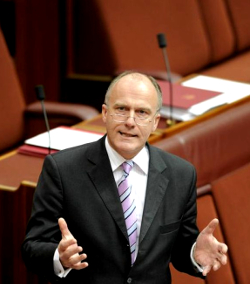Abetz absent while big strikes loom
 Workers from Human Services, the Tax Office, Border Force and Employment departments plan to walk off the job on September 15, saying they have been “low-balled” by new enterprise agreements.
Workers from Human Services, the Tax Office, Border Force and Employment departments plan to walk off the job on September 15, saying they have been “low-balled” by new enterprise agreements.
CPSU national secretary Nadine Flood says the Federal Government’s unhelpful bargaining stance has made the “unprecedented levels” of industrial action by tens of thousands of public sector workers inevitable.
She claims public service minister Senator Eric Abetz has not sat down with the union since January 2014.
“Industrial action is not the preference for these workers or the CPSU. We are up for a sensible discussion but these workers feel like they have no choice,” Ms Flood told Fairfax this week.
“This dispute is about working mums and dads, ordinary people with families, bills and mortgages to pay who are struggling to get their employer to have a sensible discussion with them.”
Ms Flood said that the existing policy would deprive Border Protection (now Border Force) workers of aorund $8000 in stripped allowance.
Meanwhile, working parents at Centrelink and Medicare are being asked to give up work and family protections.
“We have seen working parents who are facing attacks on essential work and family protections at a time when other employers are increasing their offerings to attract and retain staff,” she said.
“The government's bargaining position is more draconian that any major private sector employer in Australia. Perhaps it's time they rethought and considered a genuinely productive approach to their own workplace relations.”
The lunchtime rally and half-day strike on September 15 is likely to be followed by more strikes and industrial action around Australia.
Less than 2 per cent of the 160,000 federal public service workers have a new agreement in place.
“Very simply, we are prepared to meet with Senator Abetz anytime, anywhere to have a sensible discussion about resolving this dispute,” Ms Flood said.
Australian Taxation Office higher-ups are in a battle just to get a ballot going, due to unions taking their grievances with the process to the industrial umpire.
Unions have made submissions to the Fair Work Commission that call for “bargaining orders” forcing Tax Office bosses to tell them more, before a vote on wages.








 Print
Print